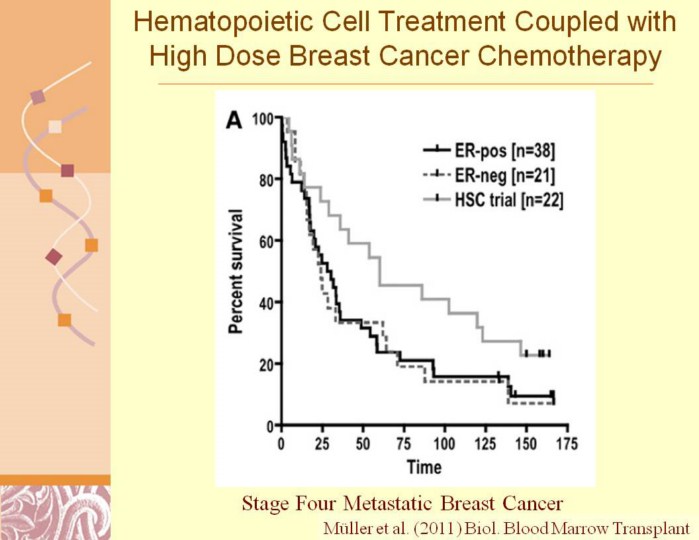| front |1 |2 |3 |4 |5 |6 |7 |8 |9 |10 |11 |12 |13 |14 |15 |16 |17 |18 |19 |20 |21 |22 |23 |24 |25 |26 |27 |28 |29 |30 |31 |32 |33 |34 |35 |review |
 |
If you have any comments or questions, please send a message to super1@pitt.edu
Metastatic breast cancer remains a major treatment challenge. The use of high-dose chemotherapy (HDCT) with rescue by autologous mobilized peripheral blood (MPB) is controversial, in part because of contamina- tion of MPB by circulating tumor cells. CD341Thy-11 selected hematopoietic stem cells (HSC) represent a graft source with a greater than 250,000-fold reduction in cancer cells. Here, we present the long-term outcome of a pilot study to determine feasibility and engraftment using HDCT and purified HSC in patients with metastatic breast cancer. Twenty-two patients who had been treated with standard chemotherapy were enrolled into a phase I/II trial between December 1996 and February 1998, and underwent HDCT followed by rescue with CD341Thy-11 HSC isolated from autologous MPB. More than 12 years after the end of the study, 23% (5 of 22) of HSC recipients are alive, and 18% (4 of 22) are free of recurrence with normal he- matopoietic function. Median progression-free survival (PFS) was 16 months, and median overall survival (OS) was 60 months. Retrospective comparison with 74 patients transplanted between February 1995 and June 1999 with the identical HDCT regimen but rescue with unmanipulated MPB indicated that 9% of patients are alive, and 7% are without disease. Median PFS was 10 months, and median OS was 28 months. In conclusion, cancer-depleted HSC following HDCTresulted in better than expected 12- to 14-year PFS and OS in a cohort of metastatic breast cancer patients. These data prompt us to look once again at purified HSC transplantation in a protocol powered to test for efficacy in advanced-stage breast cancer patients.
|
Search inside of Supercourse and lectures in HTML and PPT format